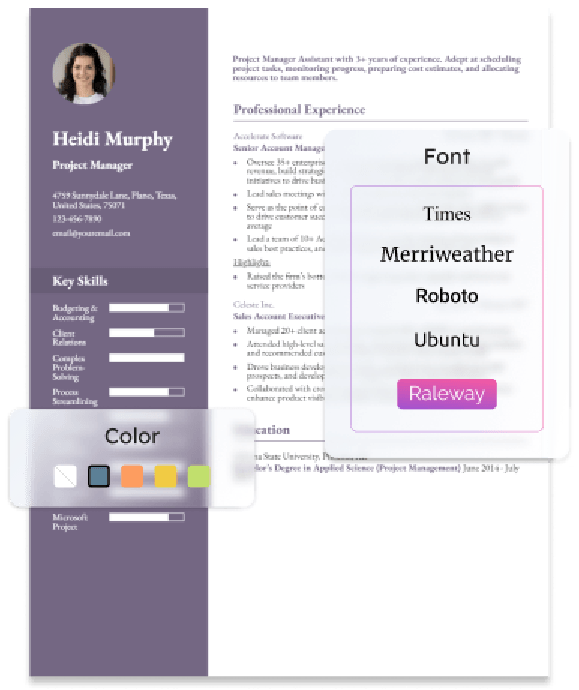As a financial analyst, you will likely have various duties based on your career and experience level. Using a resume template can help you choose which skills, accomplishments, and goals to highlight to best align with the role and level of job you are applying for. We’ll guide you through the essential elements and strategies that make a standout financial analyst resume.
Most Popular Financial Analyst Resumes
Entry-Level Financial Analyst Resume
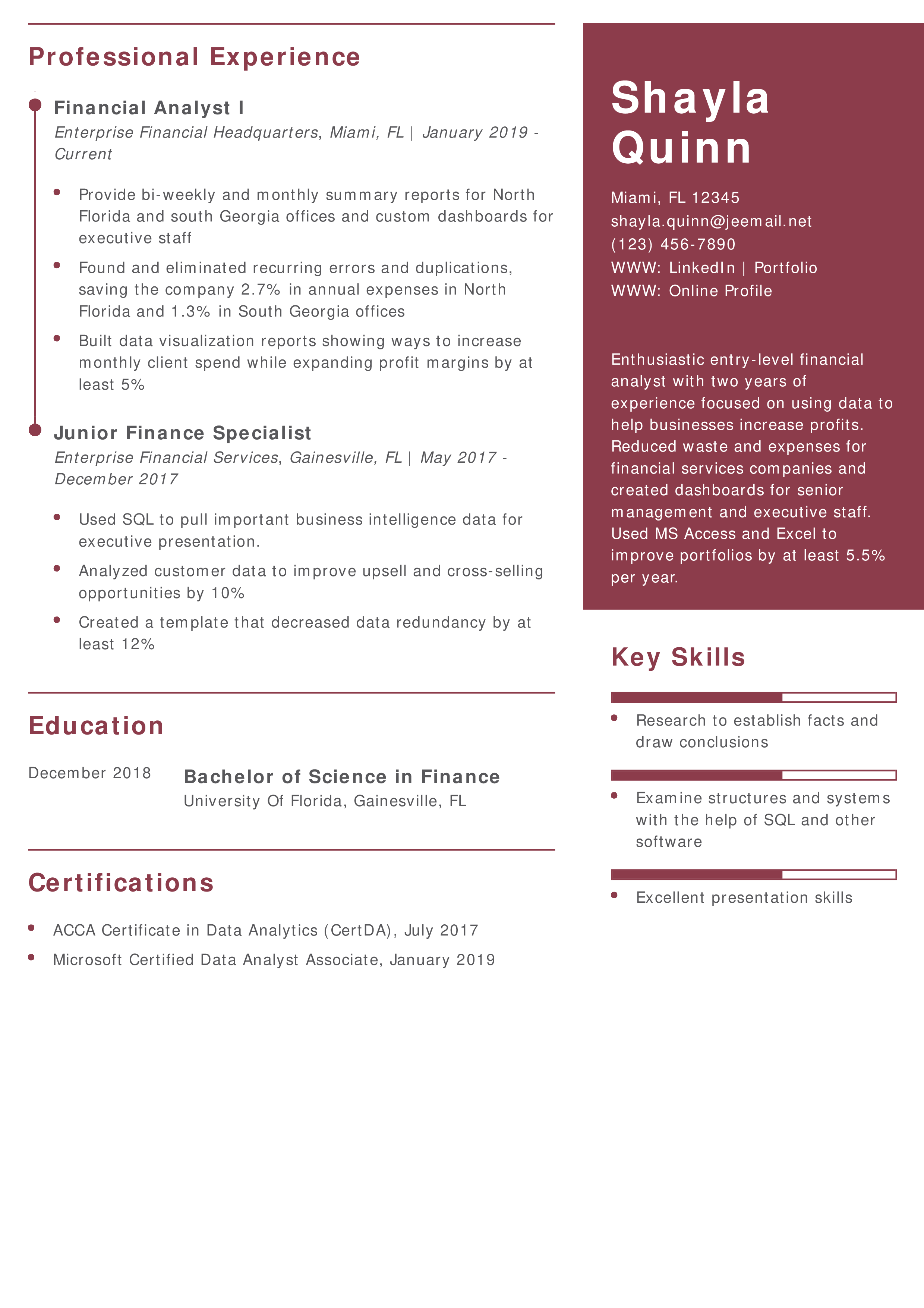
Mid-Career Financial Analyst Resume
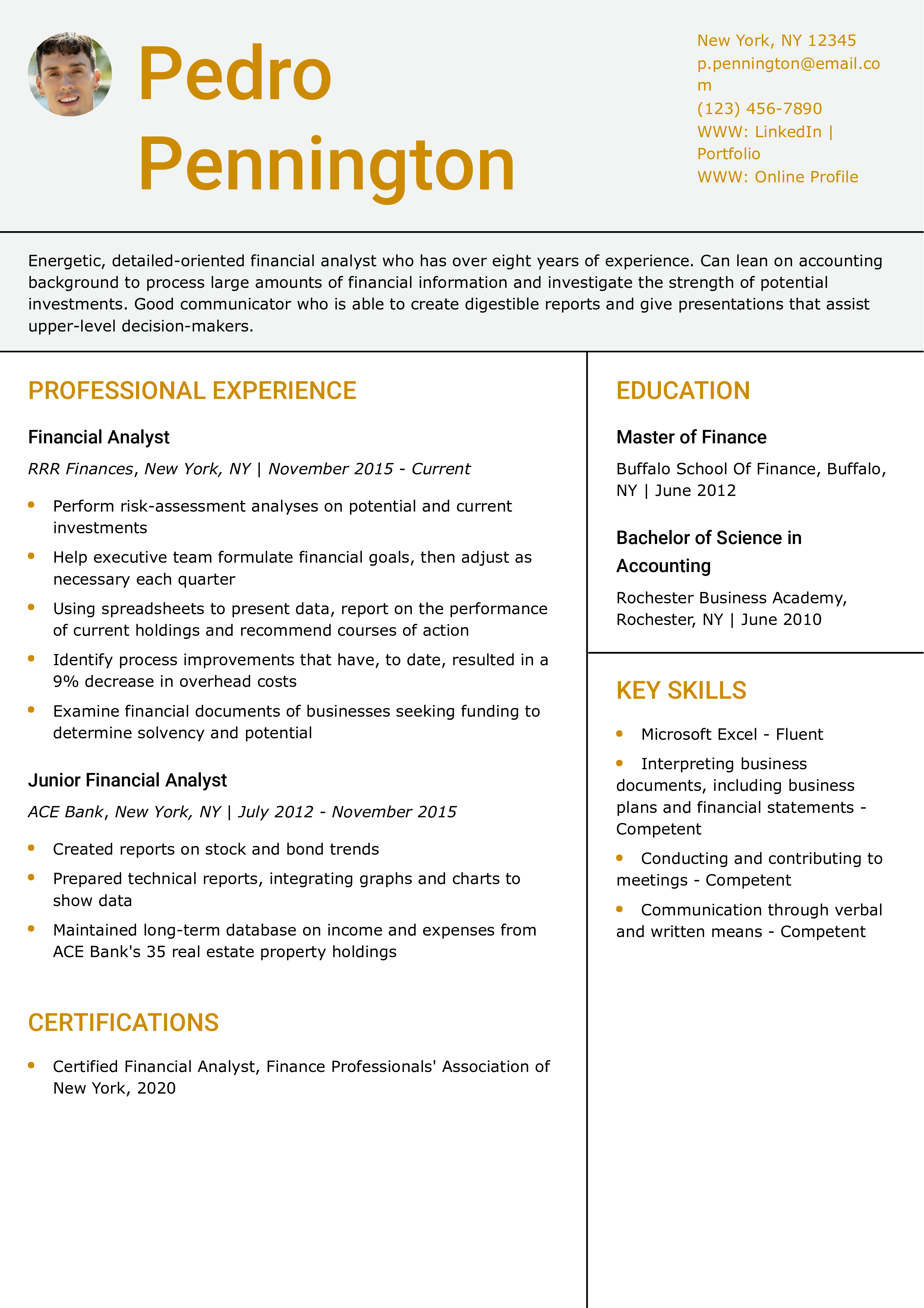
Senior-Level Financial Analyst Resume
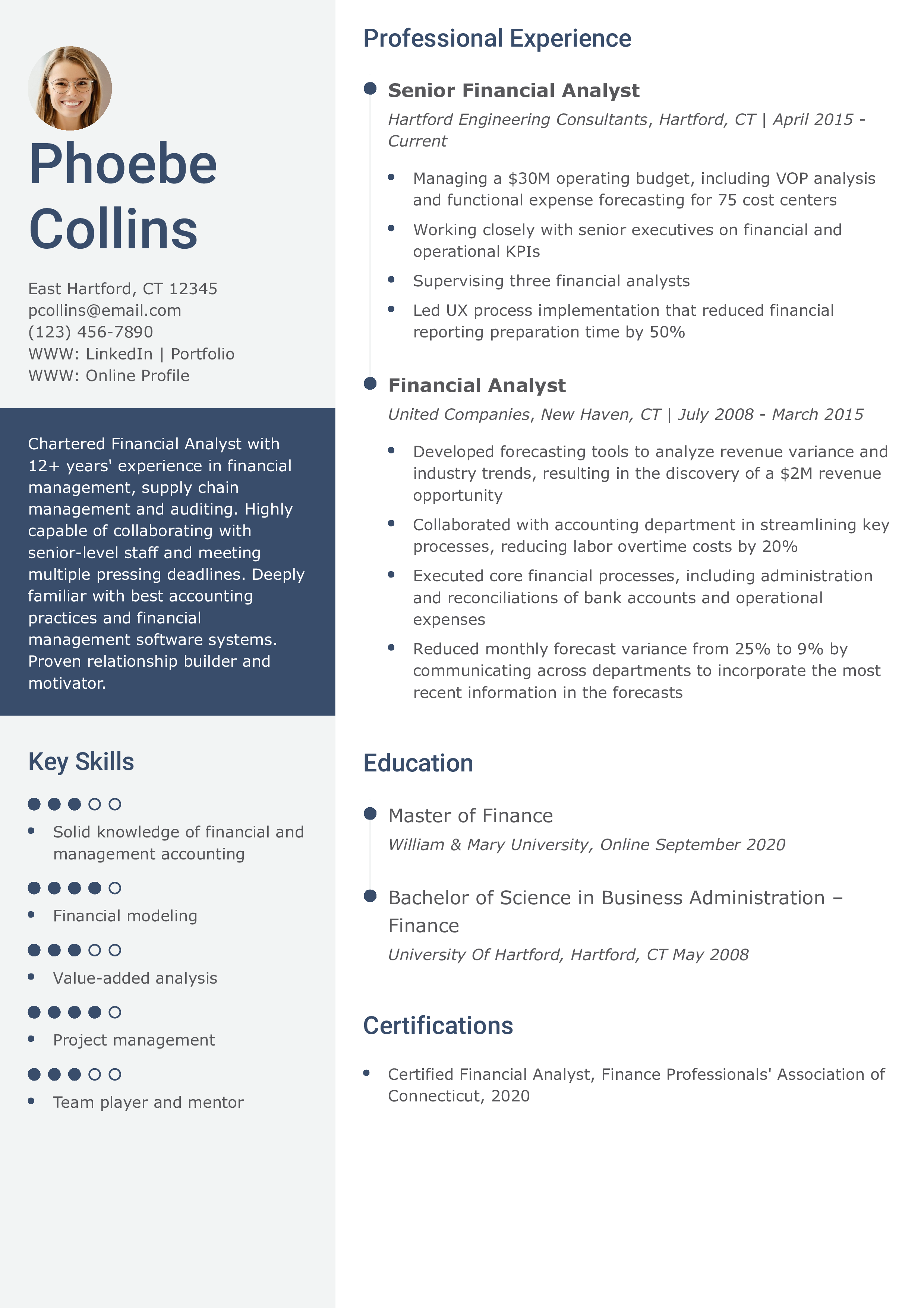
Corporate Financial Analyst Resume
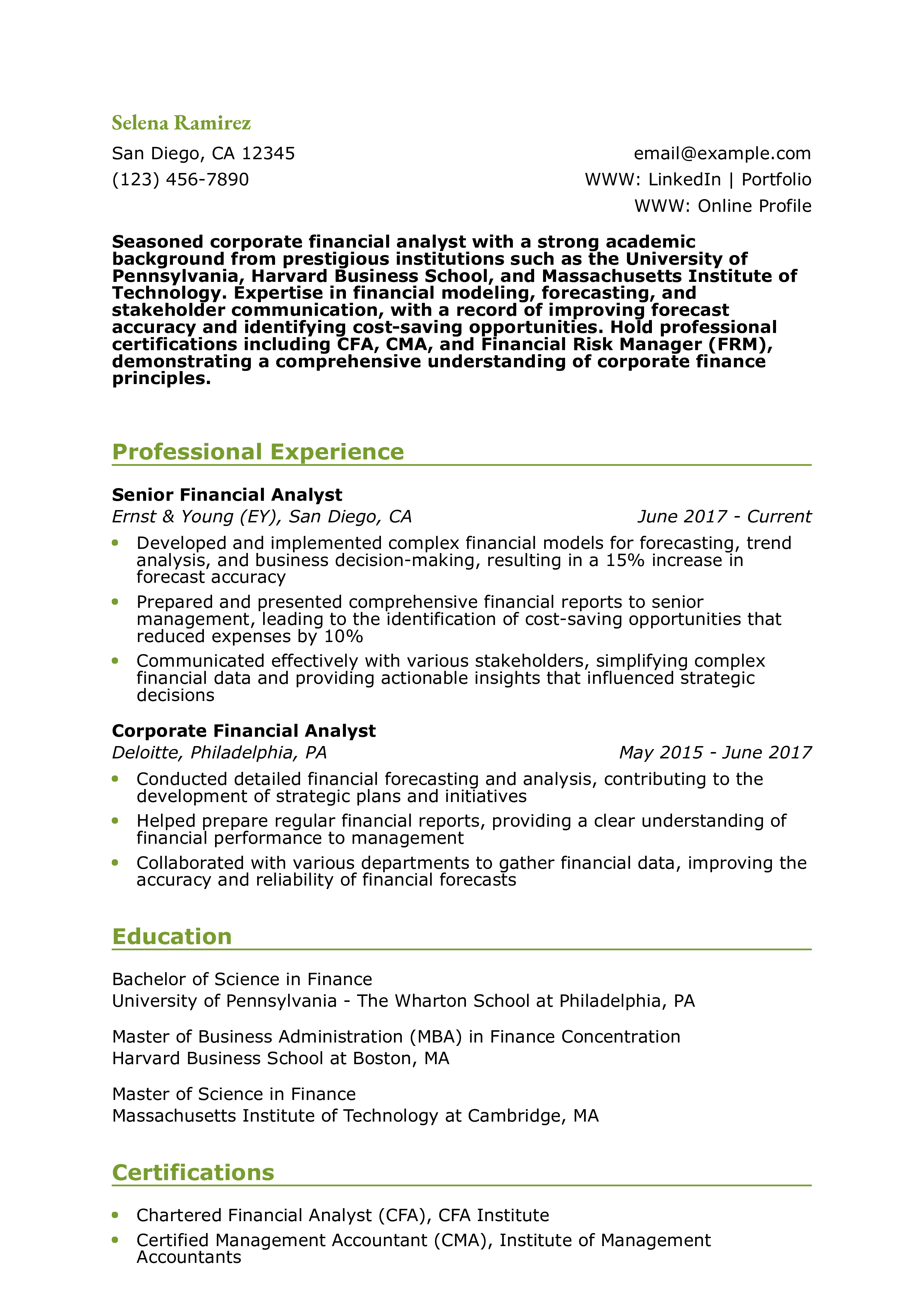
Financial Reporting Analyst Resume
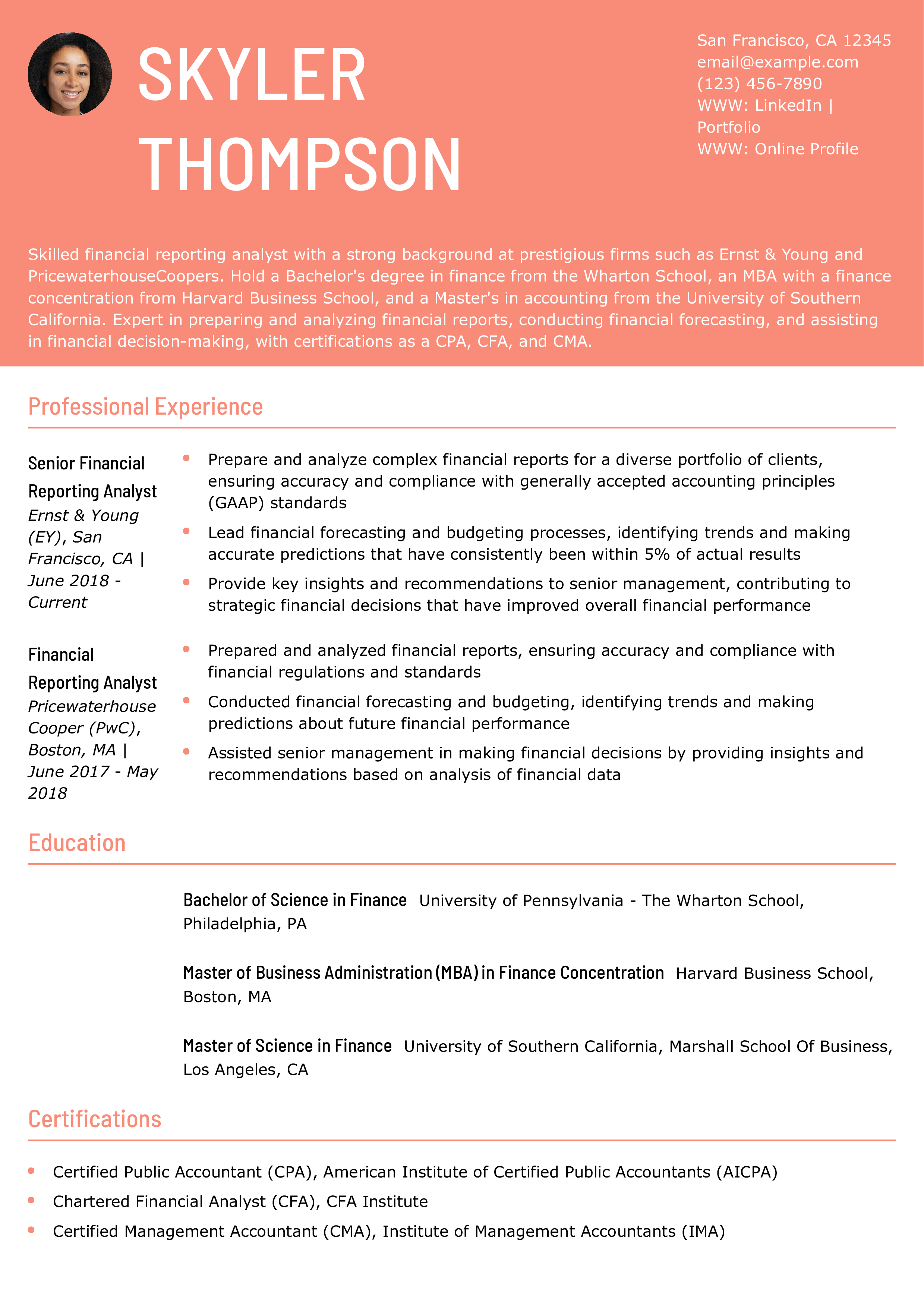
Financial Operations Analyst Resume
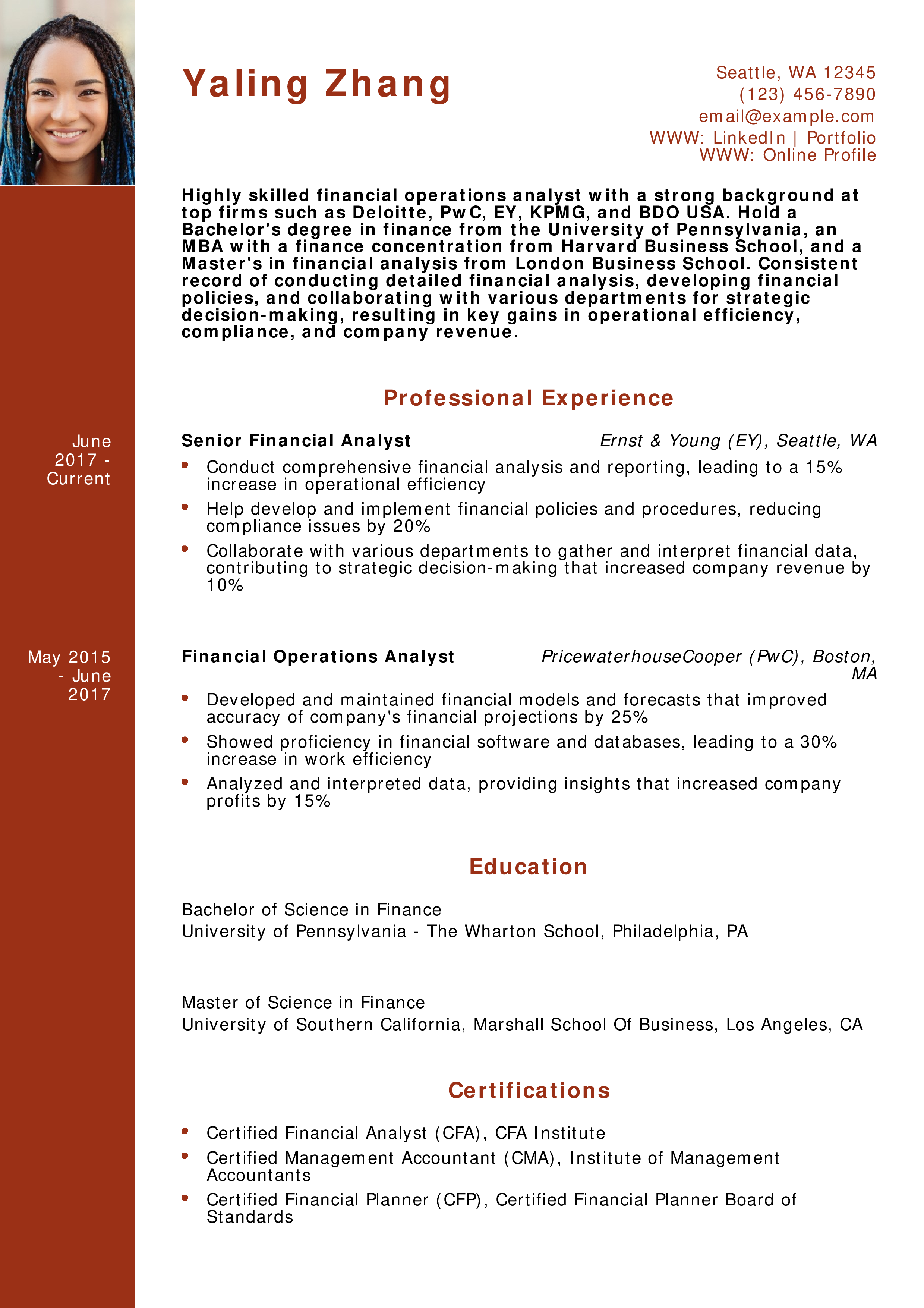
Financial Research Analyst Resume
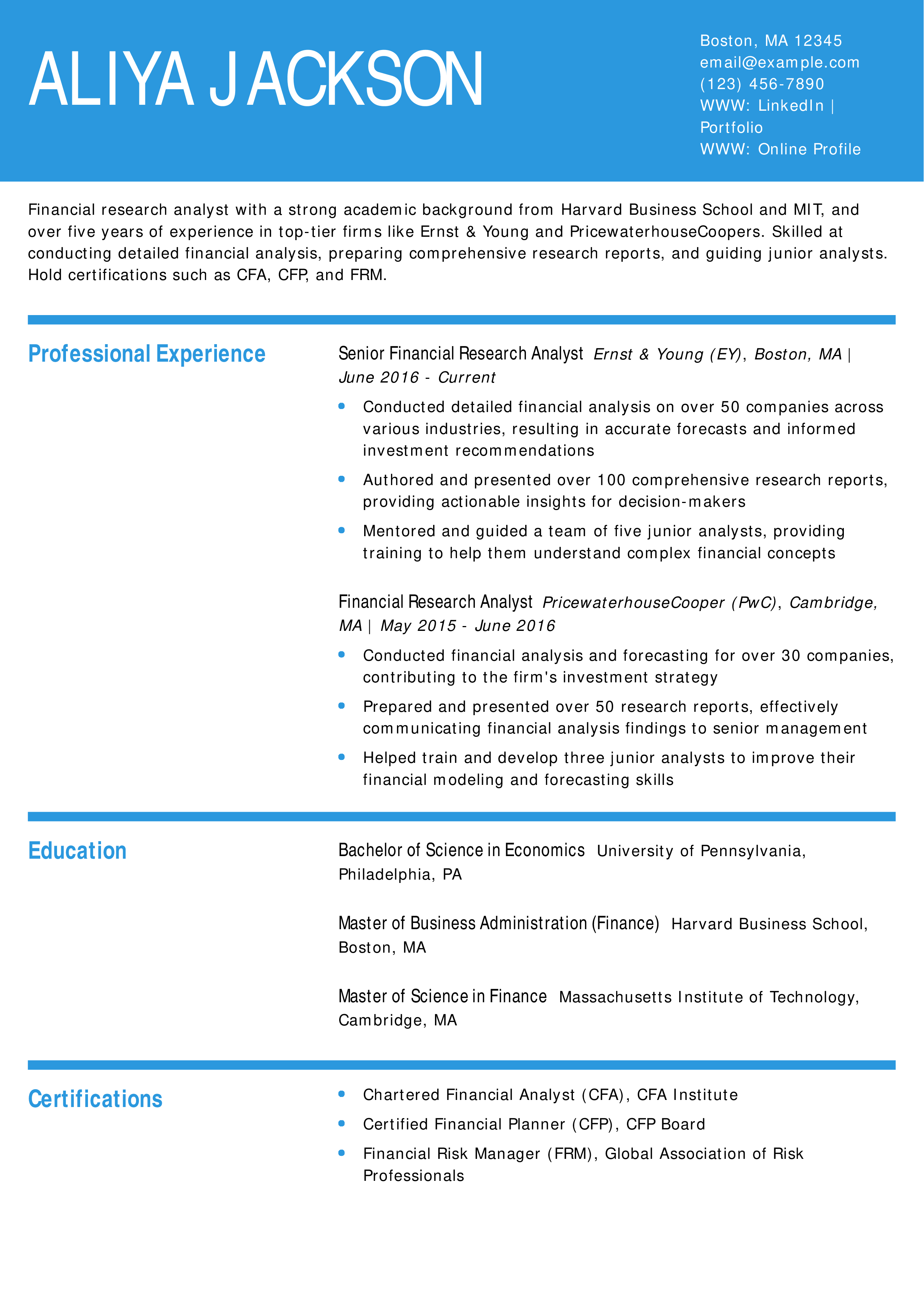
Business Analyst Resume
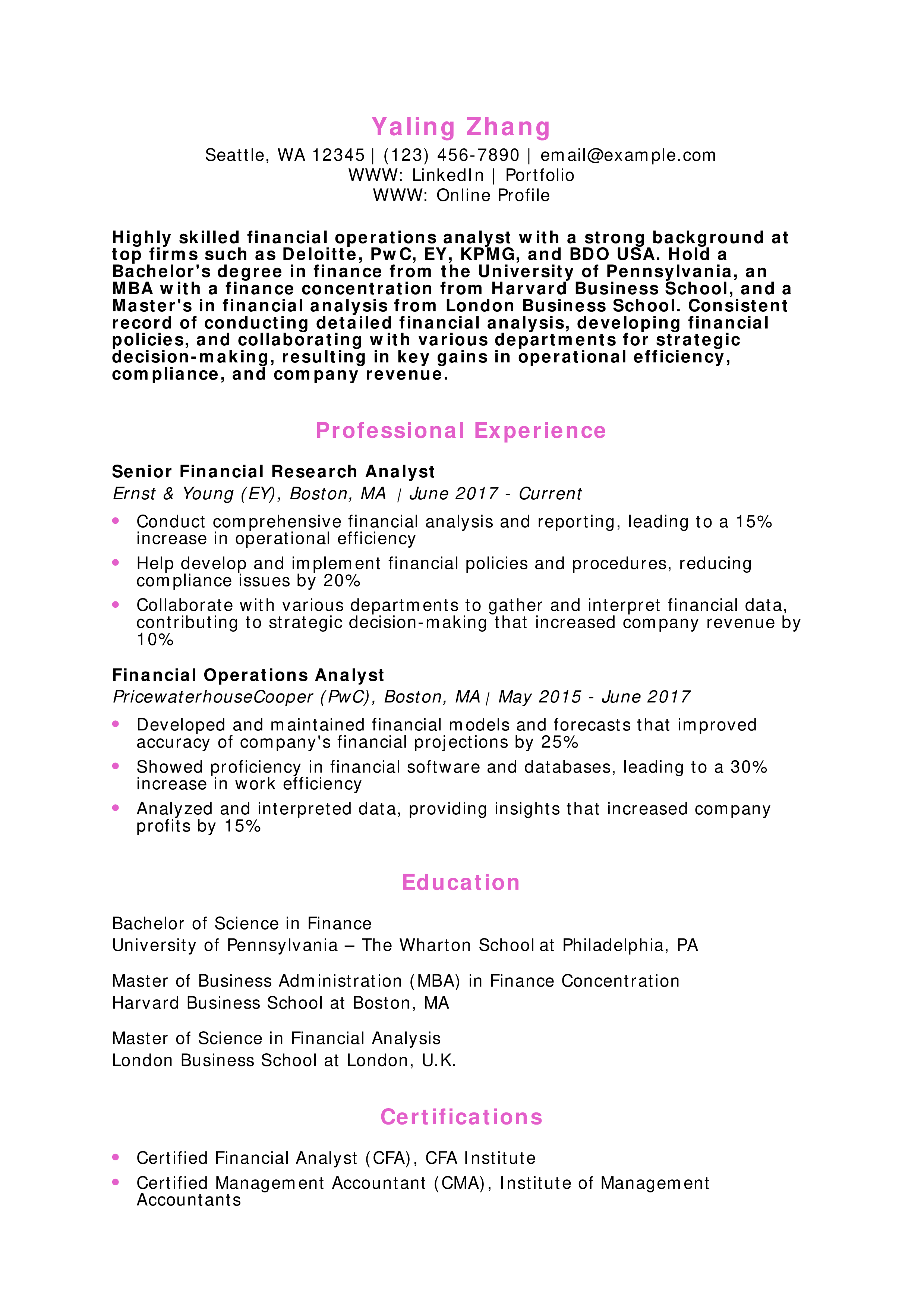
Data Analyst Resume
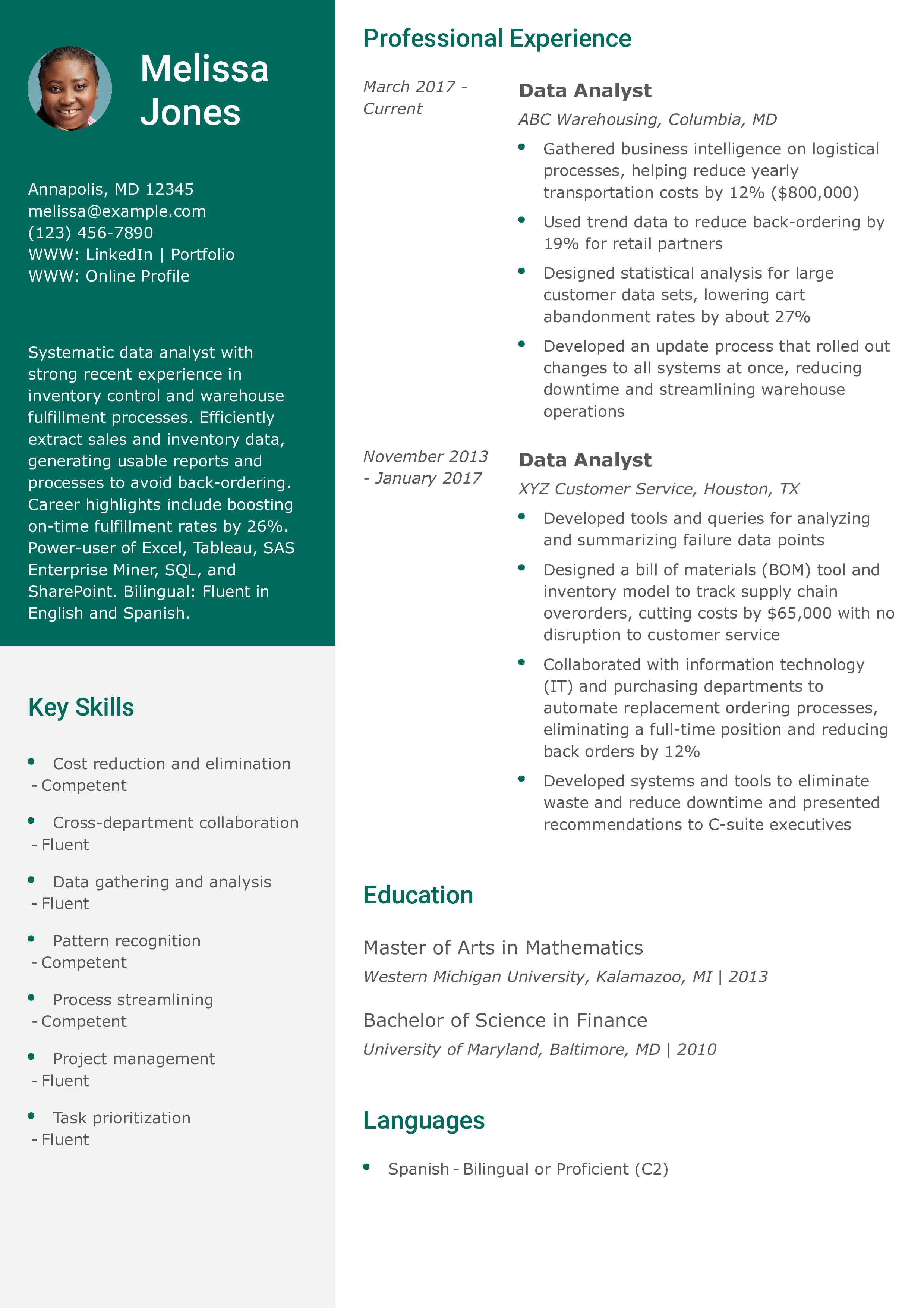
Accountant Resume
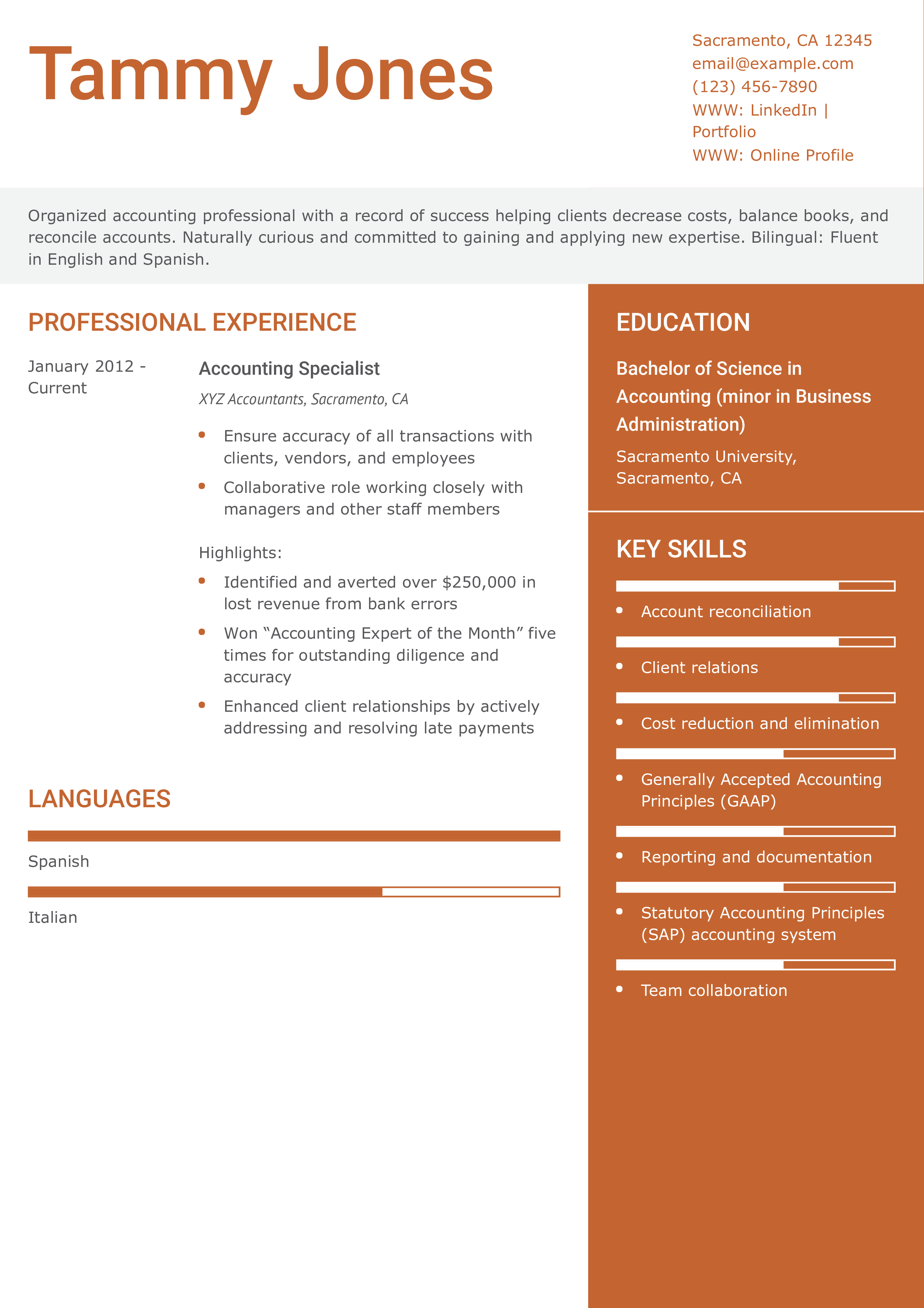
Financial Systems Analyst Resume
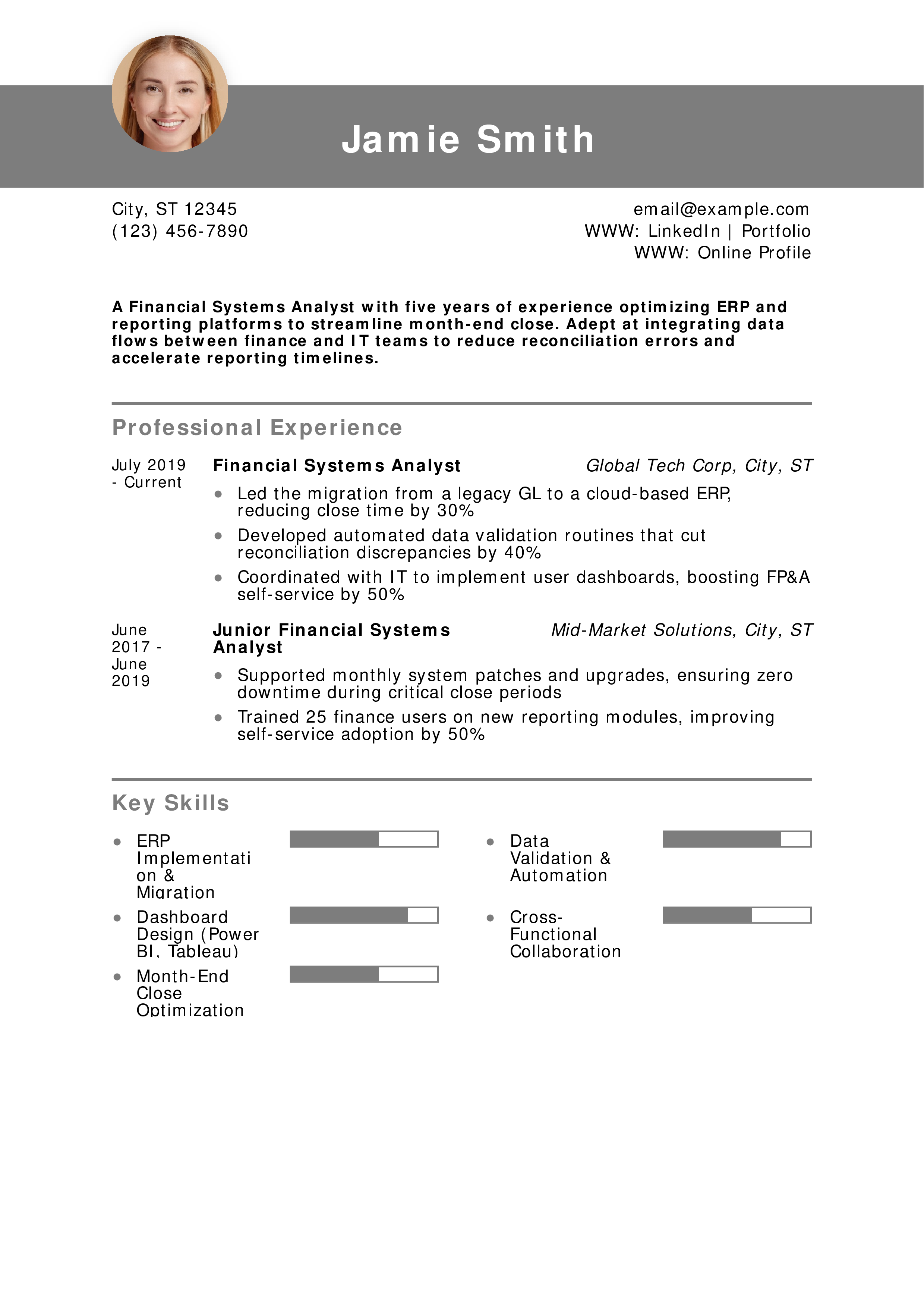
Why This Resume Is a Great Example
Jamie’s resume highlights a clear 30% reduction in close time and a 40% drop in errors, showcasing tangible systems improvements. It balances technical detail with collaboration wins, demonstrating value to both finance and IT.
Key Tips
Include quantifiable system metrics, like “reduced errors by 40%,” to illustrate your technical impact. For more on showcasing technical finance skills, see our Technical Skills Guide.
Real Estate Financial Analyst Resume
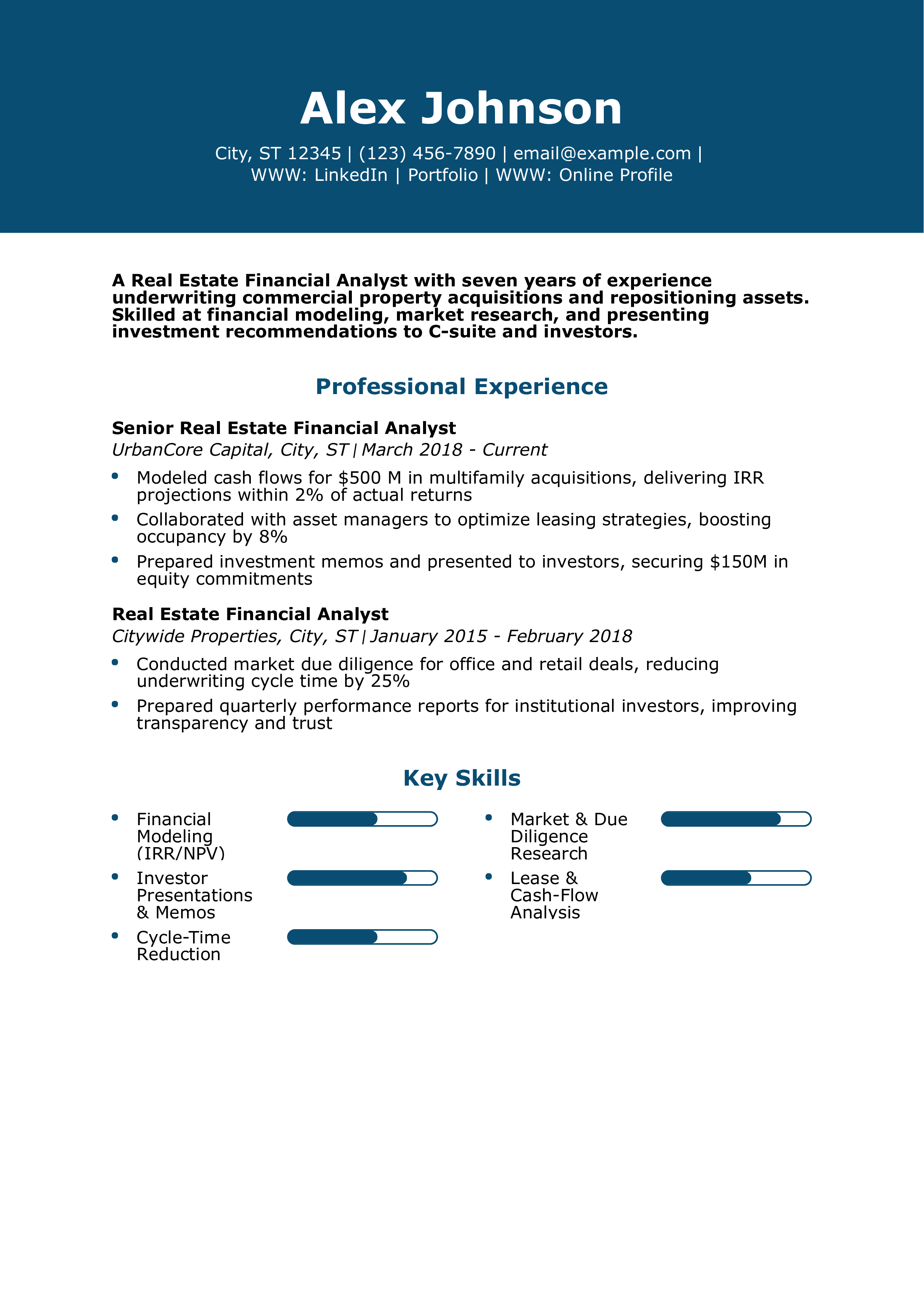
Why This Resume Is a Great Example
Alex’s resume quantifies underwriting accuracy and process improvements, two metrics real estate firms care about most. The mix of modeling, research, and investor reporting highlights a well-rounded analyst profile.
Key Tips
Highlight both deal metrics (like IRR) and process gains (like “reduced cycle time by 25%”). For guidance on structuring finance resumes, see Best Resume Formats.
Healthcare Financial Analyst Resume
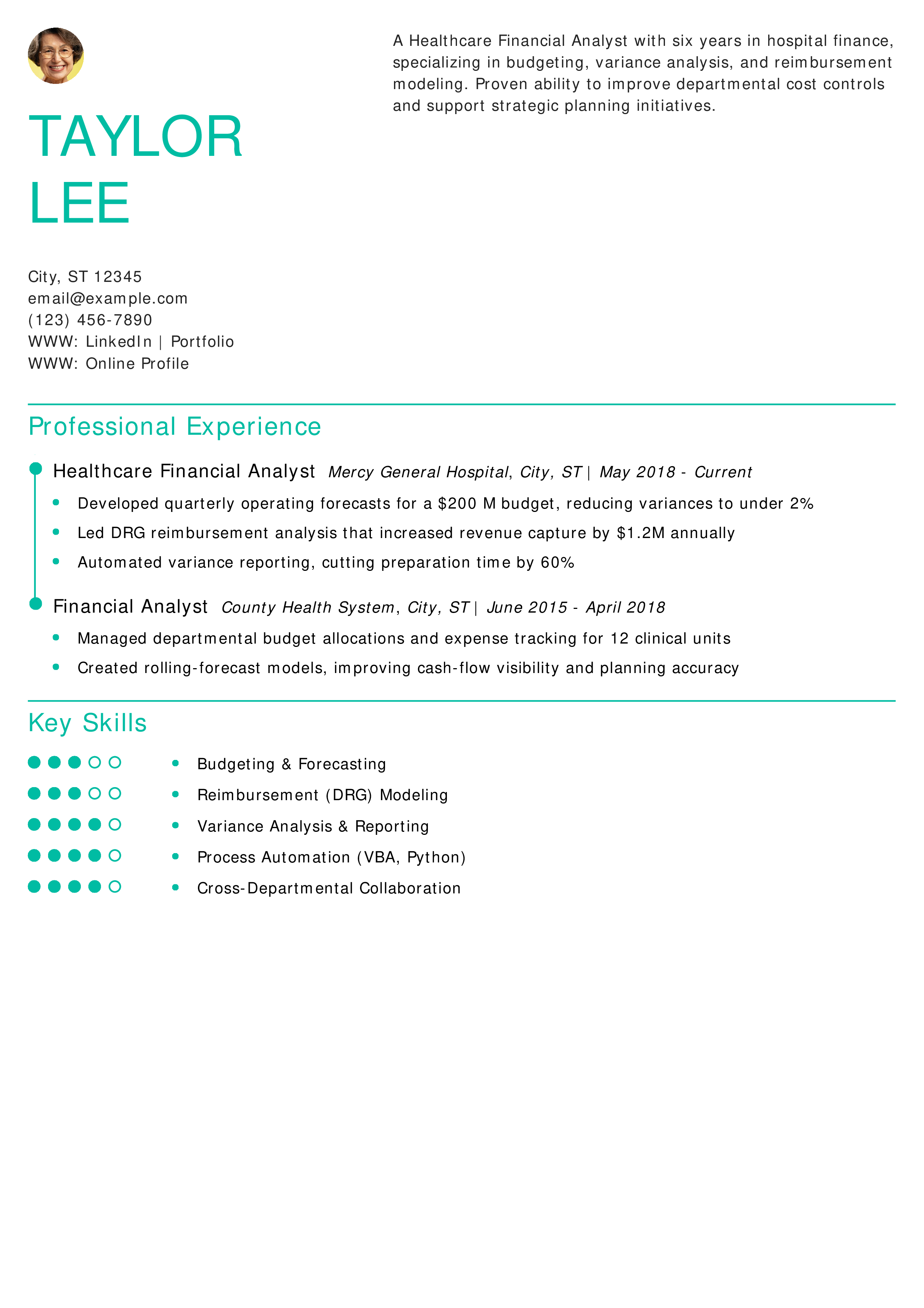
Why This Resume Is a Great Example
Taylor Lee’s resume emphasizes both revenue impact and forecasting accuracy—critical in healthcare finance. The big “$1.2 M” reimbursement lift immediately demonstrates value.
Key Tips
Combine clinical finance skills (like DRG modeling) with process improvements to stand out. For more on what to include in healthcare finance resumes, see What To Put on a Resume.
Junior Financial Analyst Resume
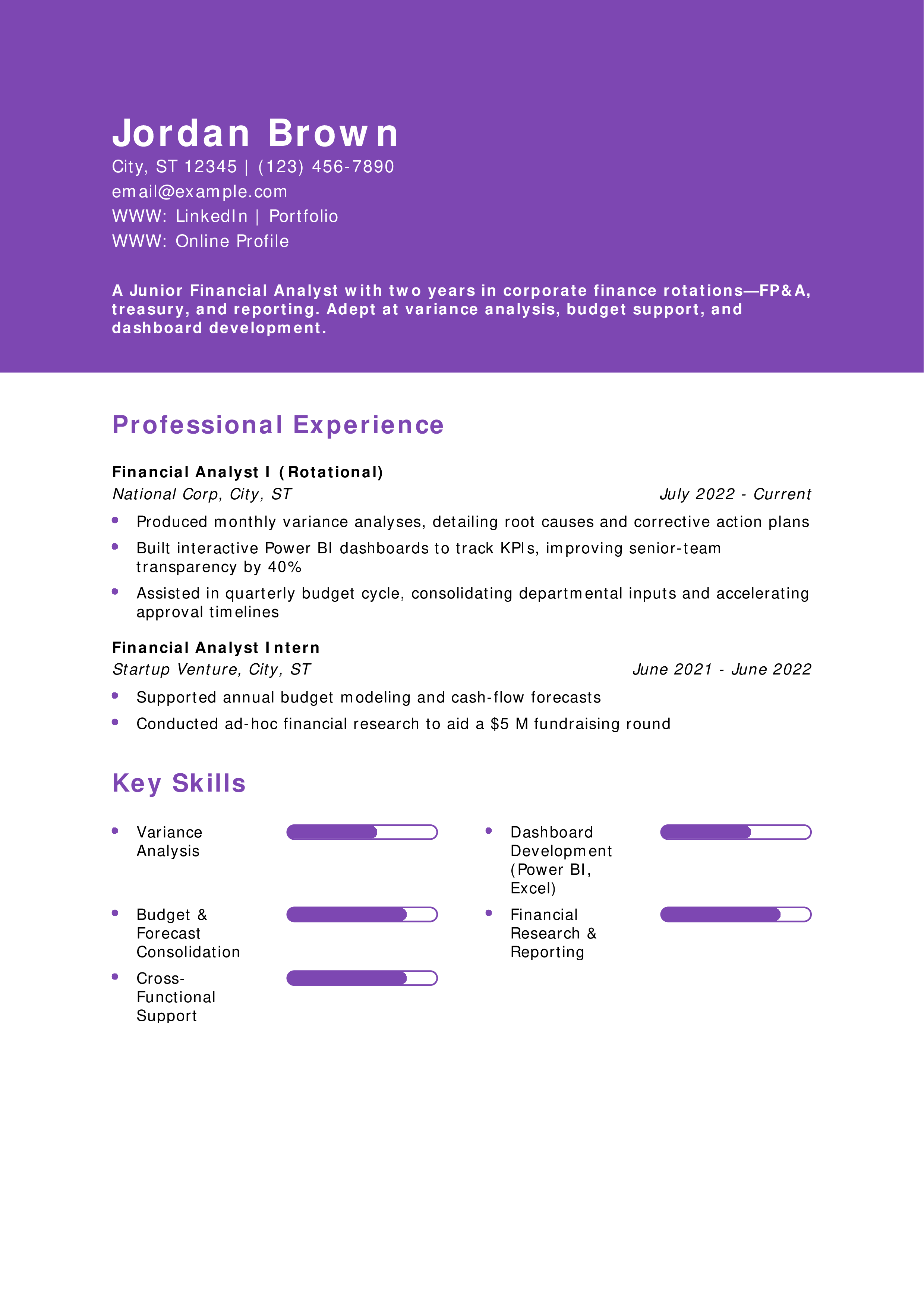
Why This Resume Is a Great Example
Jordan’s resume showcases quick, impactful contributions, like dashboard creation and variance analysis, to demonstrate early-career value. Rotational duties signal adaptability.
Key Tips
Emphasize both technical tools (Power BI) and core finance tasks. For advice on writing objectives and summaries, see Resume Objective Examples.
Financial Risk Analyst Resume
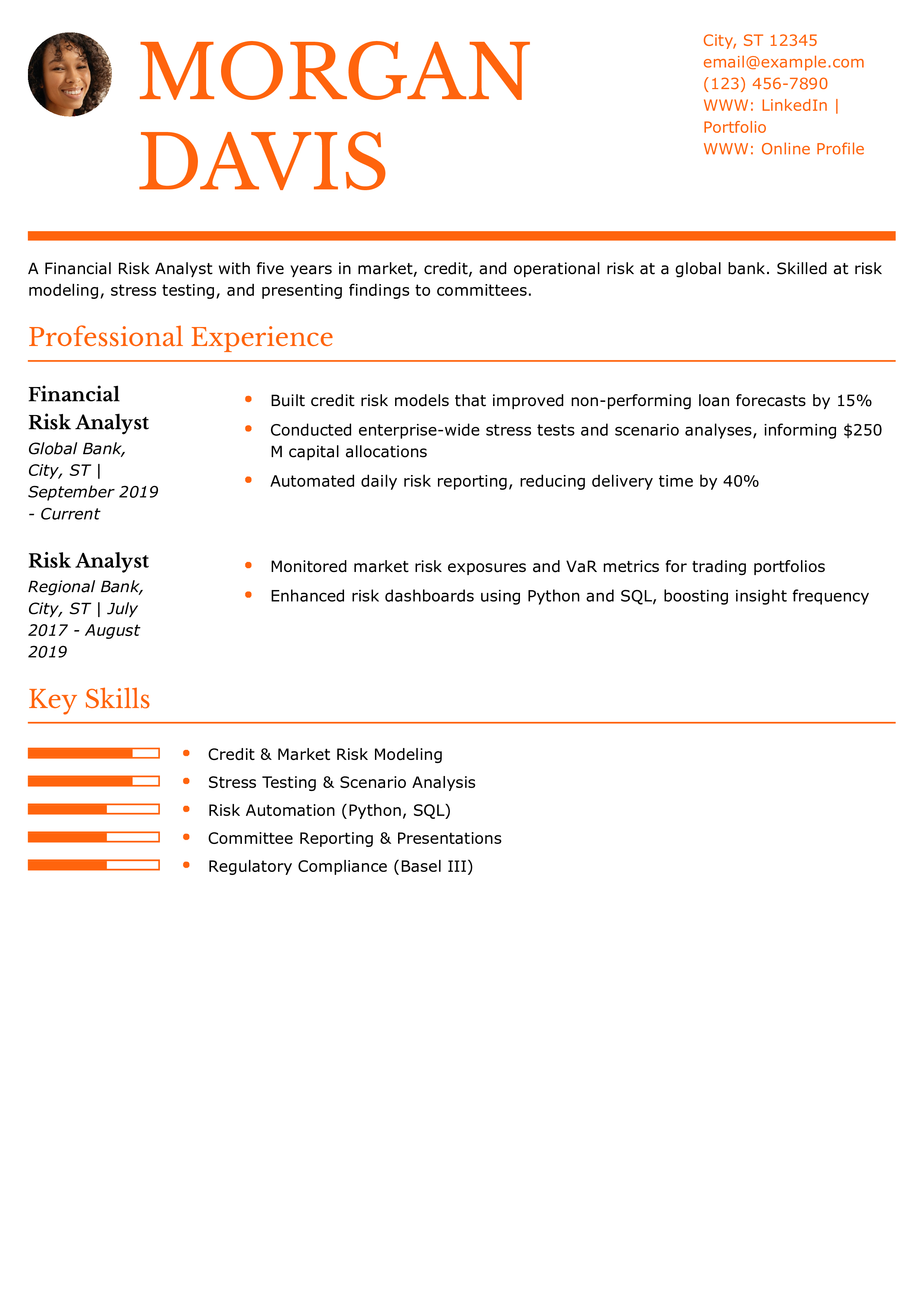
Why This Resume Is a Great Example
Morgan’s resume balances technical model metrics with process automation achievements, which is key for risk roles. Stress-testing successes and time savings quantify real impact.
Key Tips
Quantify both risk-model accuracy and time savings to highlight your impact. For more on technical finance skills, see our technical skills guide.
Budget Analyst Resume
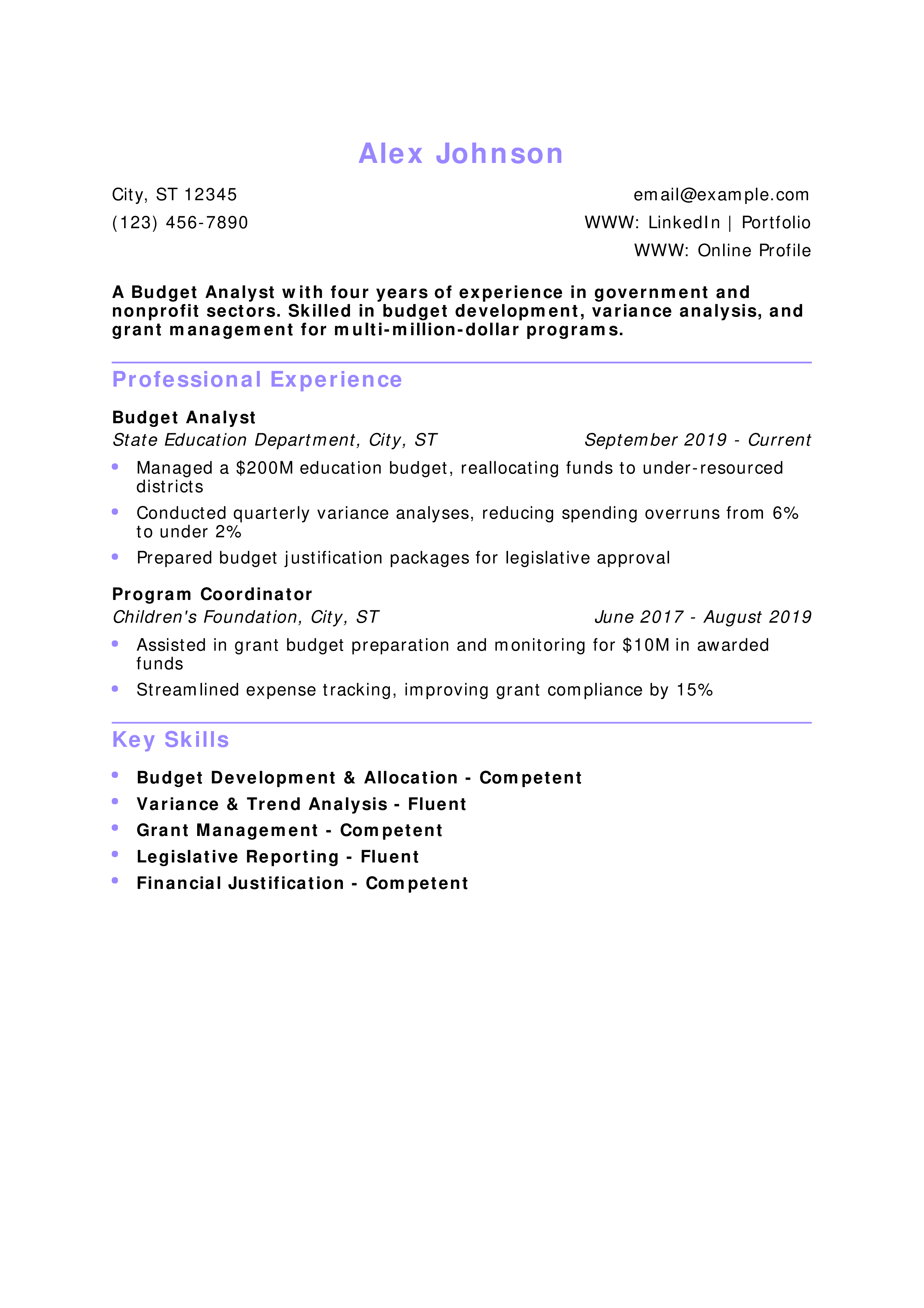
Why This Resume Is a Great Example
Alex’s resume connects budget oversight with clear performance improvements, such as variance reduction and fund reallocation. It balances technical and stakeholder-facing achievements.
Key Tips
Show legislative or stakeholder outcomes, like “legislative approval,” to underscore influence. For structures and formats, check out Resume Outline Examples.
FP&A Analyst Resume
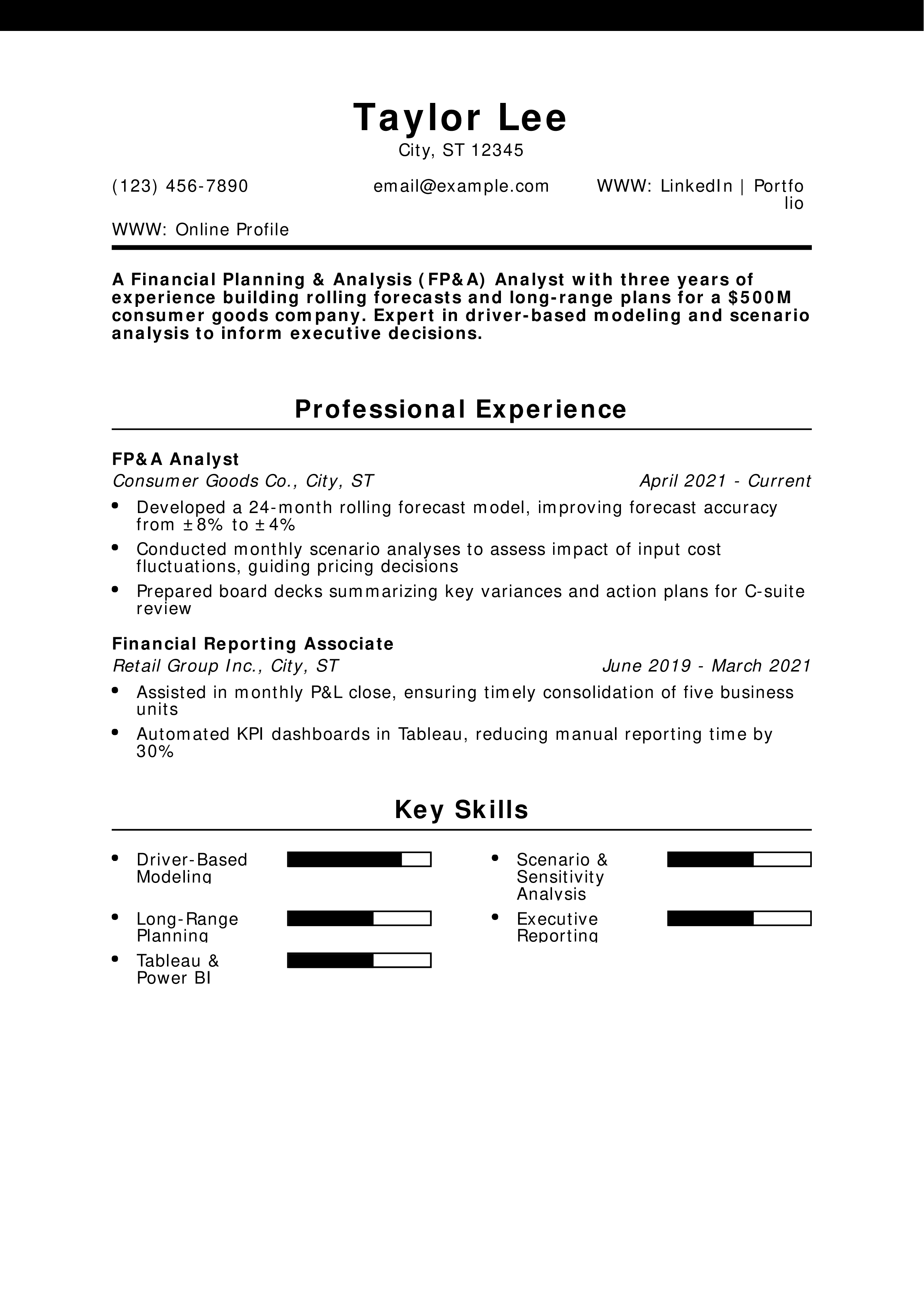
Why This Resume Is a Great Example
Taylor’s resume directly ties FP&A deliverables, such as forecasts and scenarios, to improved accuracy and decision support. It showcases both technical modeling skills and board-level communication.
Key Tips
Provide quantified improvements, like “forecast accuracy from ±8% to ±4%,” to demonstrate impact. For guidance on structuring your financial summaries, see Resume Summary Examples.
M&A Analyst Resume
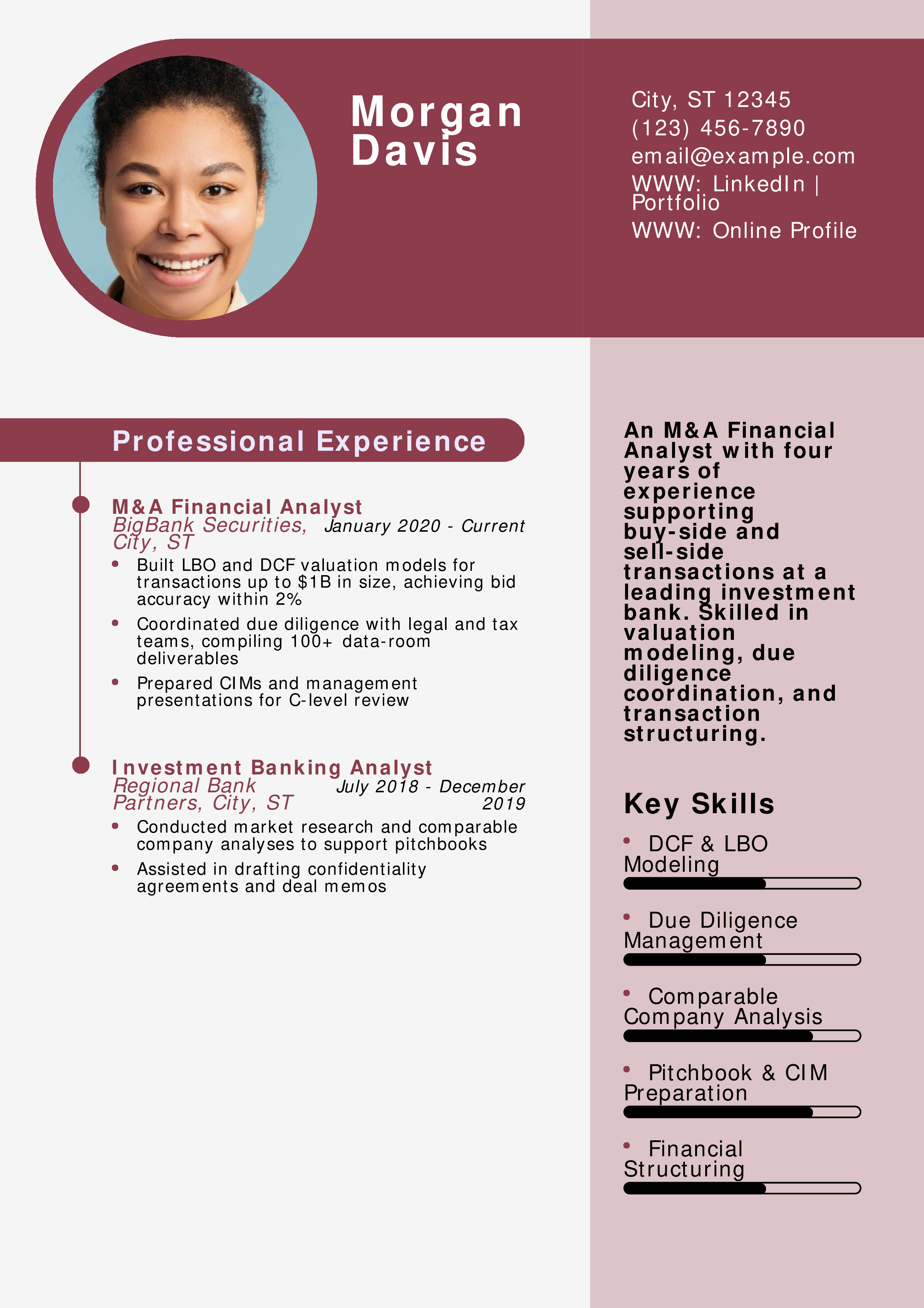
Why This Resume Is a Great Example
Morgan Davis’s resume highlights precise modeling work tied to large-scale transactions and rigorous due diligence coordination. It balances technical and project-management skills essential for M&A.
Key Tips
Highlight deal size and modeling accuracy to showcase transaction expertise. For tips on emphasizing transaction experience, see Best Resume Formats.
Treasury Analyst Resume
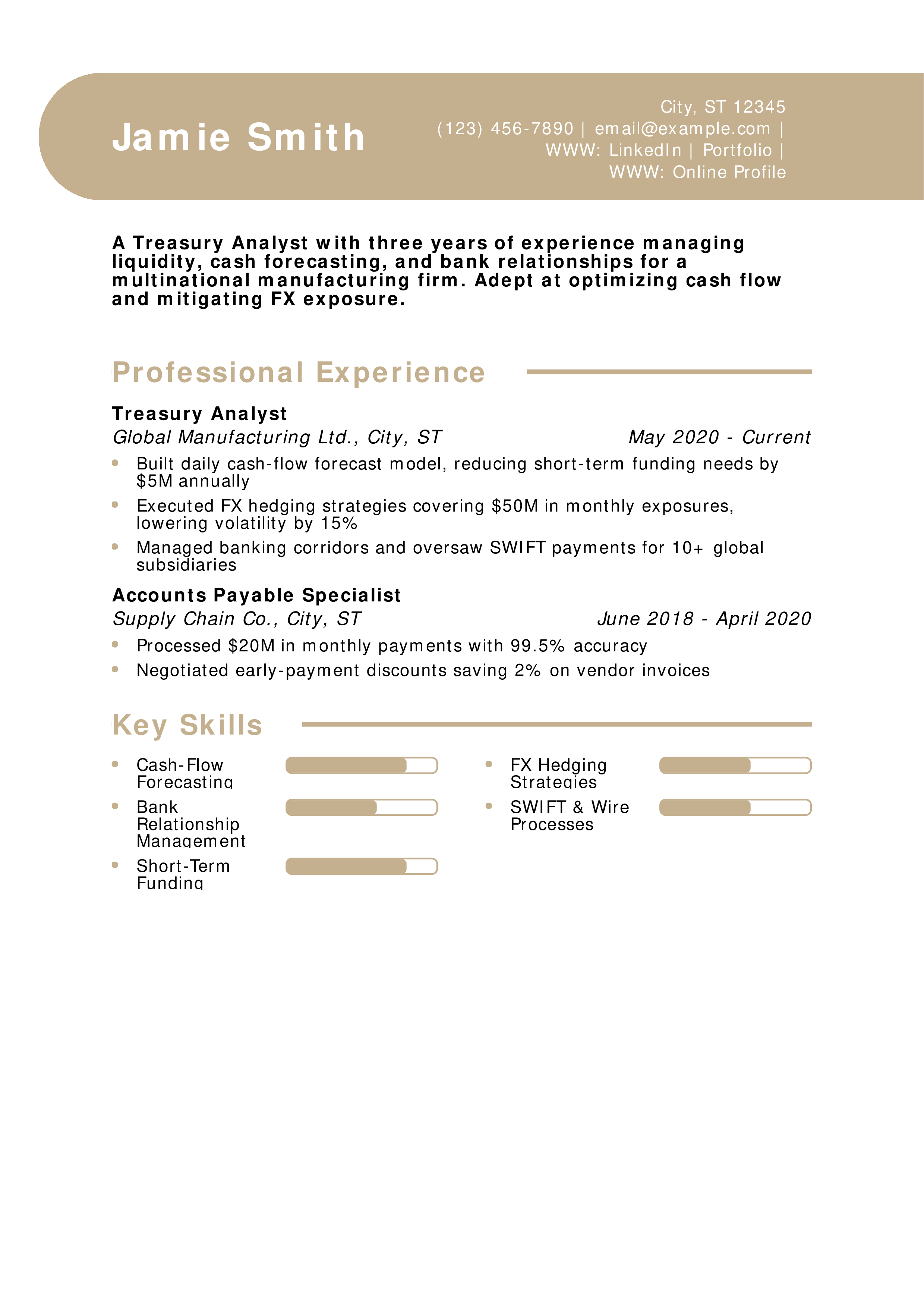
Why This Resume Is a Great Example
Jamie’s resume ties daily forecasting and hedging actions to concrete savings and volatility
Key Tips
Include specific savings and risk-reduction metrics to underscore impact. For advice on showcasing technical skills, see Technical Skills for Resume.
Hospital Financial Analyst Resume
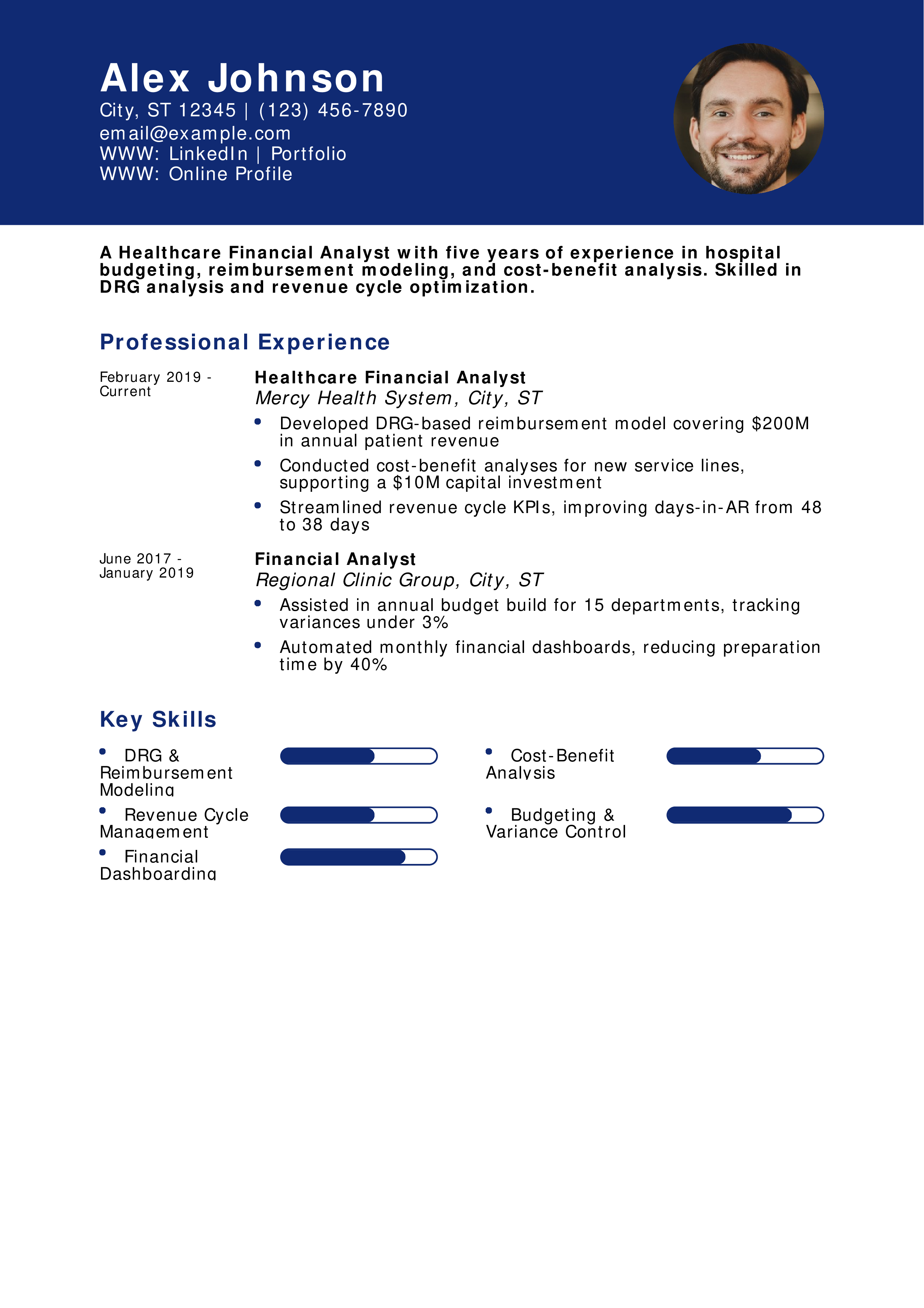
Why This Resume Is a Great Example
Alex’s resume shows domain expertise in DRG modeling and revenue cycle improvements critical for healthcare finance. It demonstrates both analytical and process-improvement capabilities.
Key Tips
Cite key operational metrics, like “days-in-AR from 48 to 38,” to show efficiency gains. For structuring healthcare resumes, see What to Put on a Resume.
Investment Banking Analyst Resume
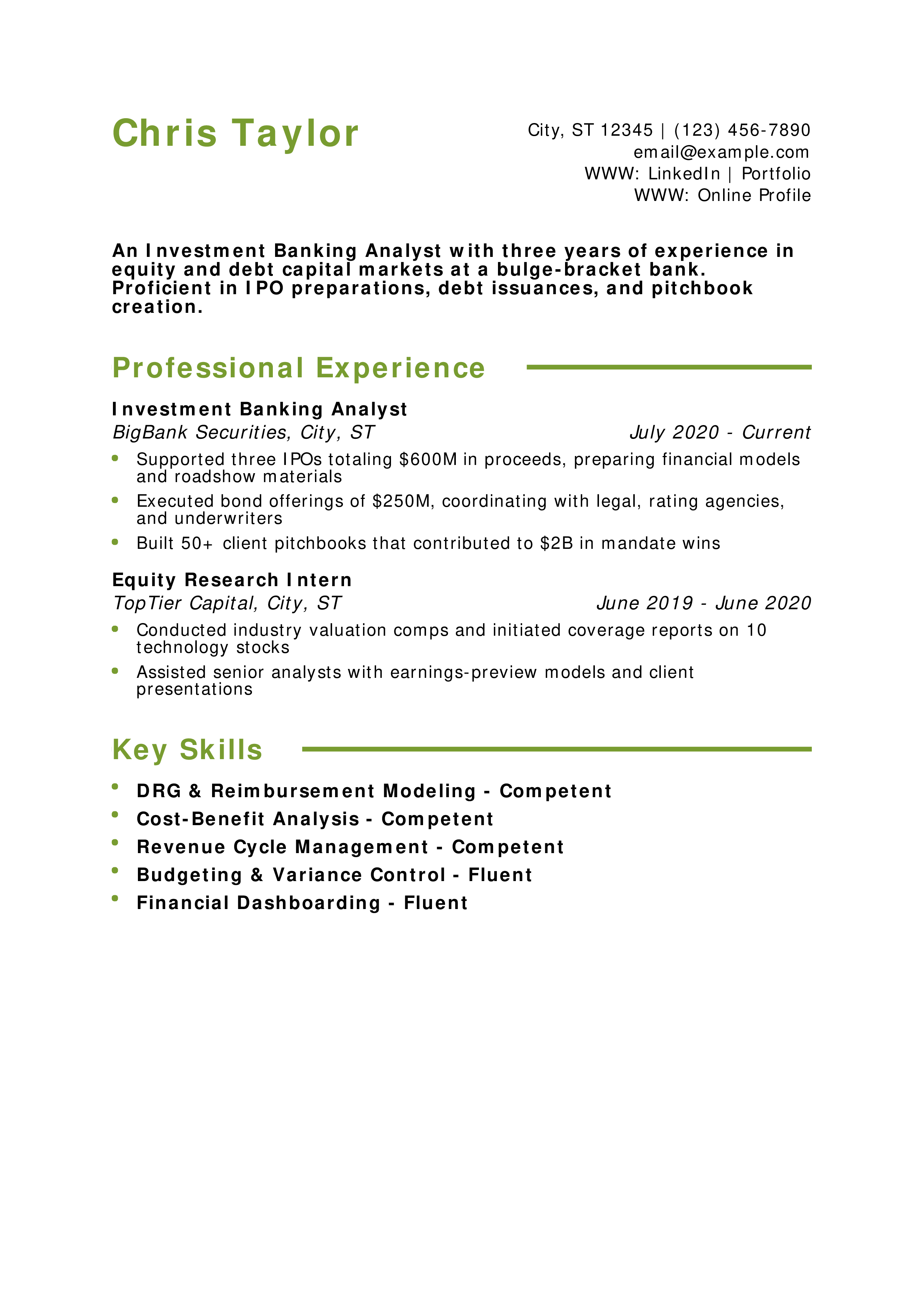
Why This Resume Is a Great Example
Chris’s resume quantifies capital-markets experience, such as IPOs and bond issuances, and links to mandate wins, which is crucial in banking. It shows both execution and origination support.
Key Tips
Display deal sizes and outcomes to emphasize your role in capital raises. For more on financial transaction bullet formatting, see Best Resume Formats.
ESG Financial Analyst Resume
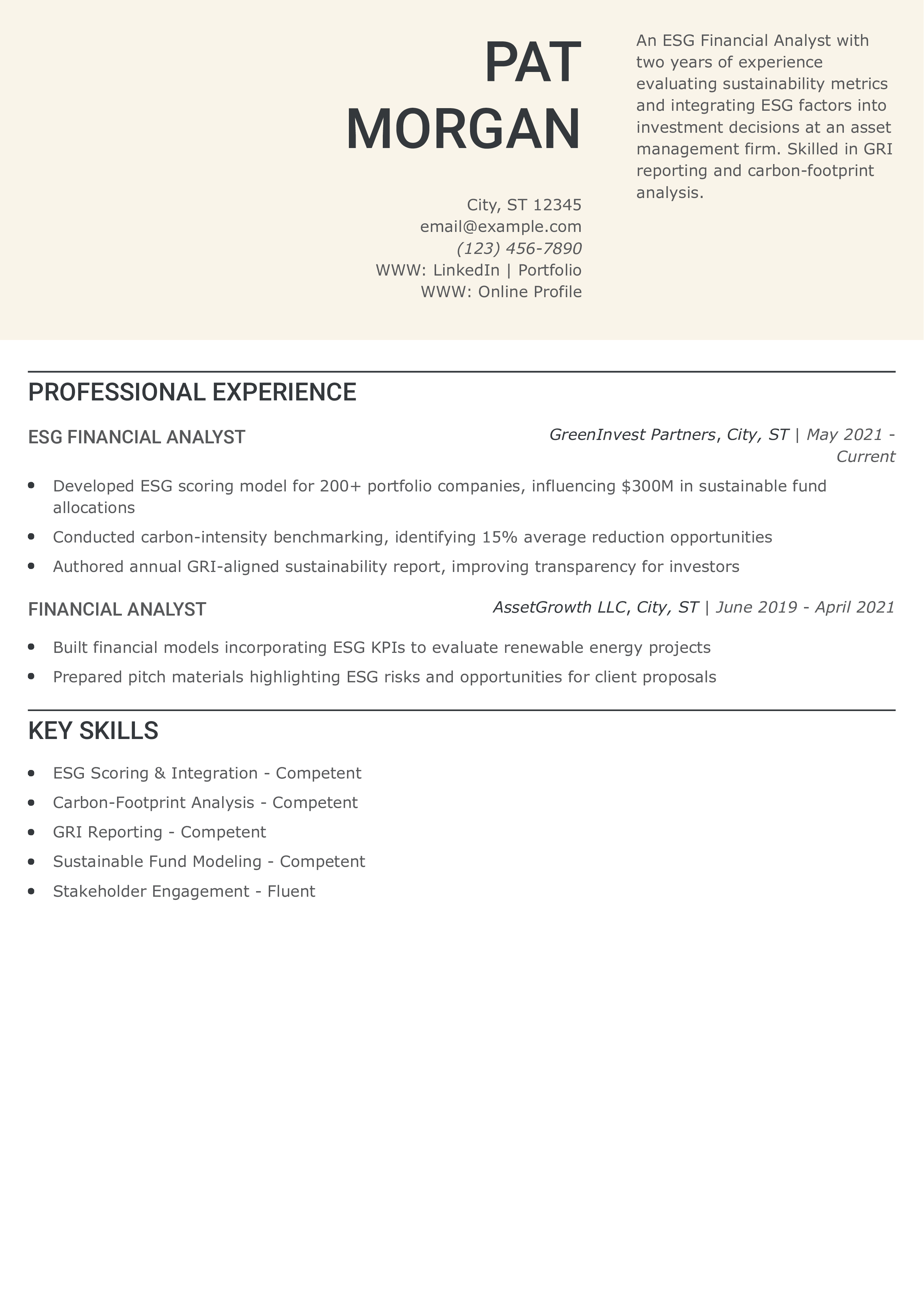
Why This Resume Is a Great Example
Pat’s resume ties ESG analysis to actual fund allocations and carbon reductions, which are key deliverables in sustainable investing. It demonstrates both technical and reporting skills.
Key Tips
Highlight ESG metrics and fund impacts to show real-world influence. For advice on showcasing soft skills in analysis, see Soft Skills for Resume.
Strategic Financial Analyst Resume
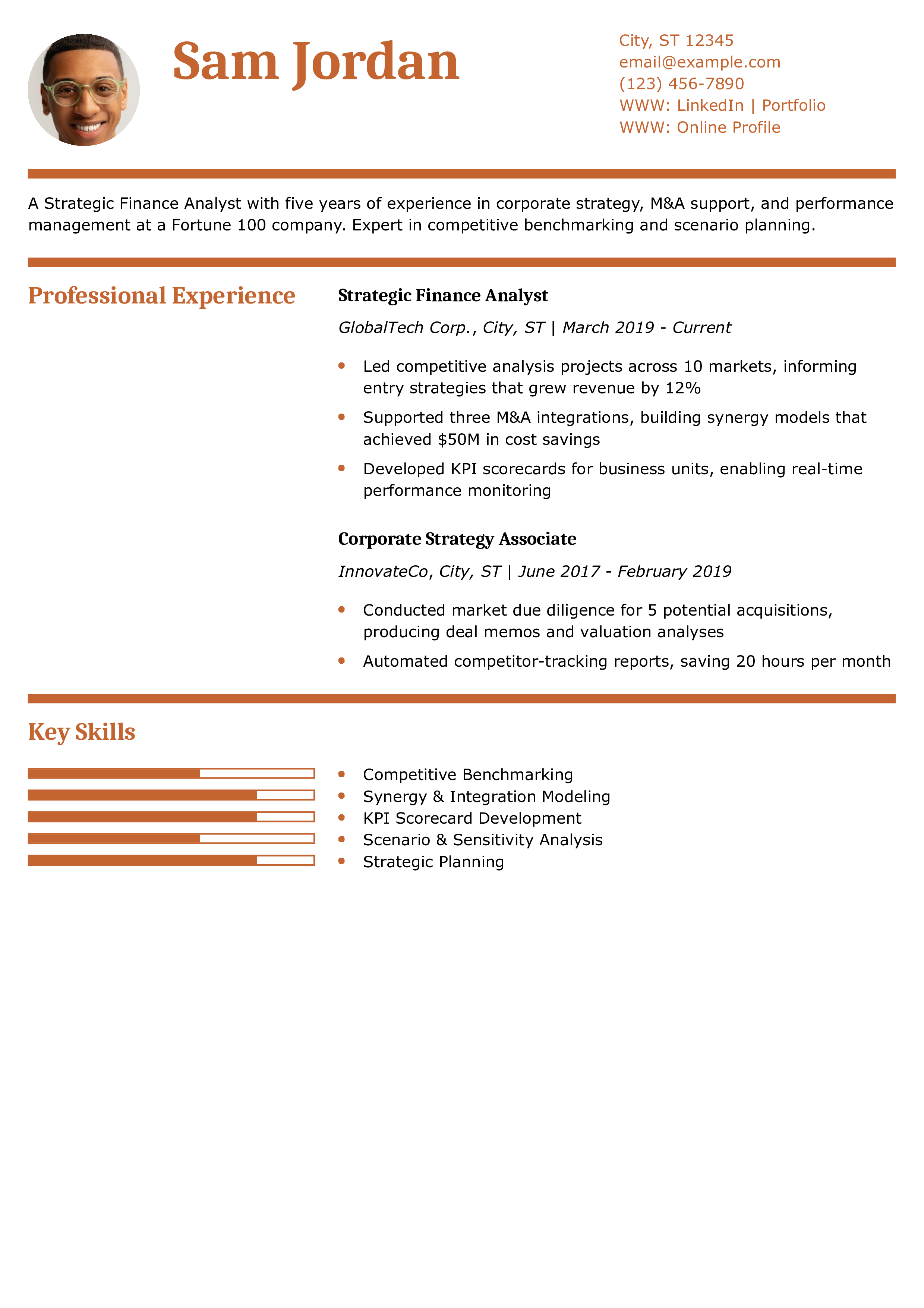
Why This Resume Is a Great Example
Sam’s resume demonstrates strategic impact, like market entry revenue and M&A synergies, and ties them to dollar-value outcomes. It balances strategy and finance.
Key Tips
Use measurable strategic outcomes, like “grew revenue by 12%,” to convey business impact. For help with accomplishments language, see Resume Outline Examples.
Cost Accountant Resume
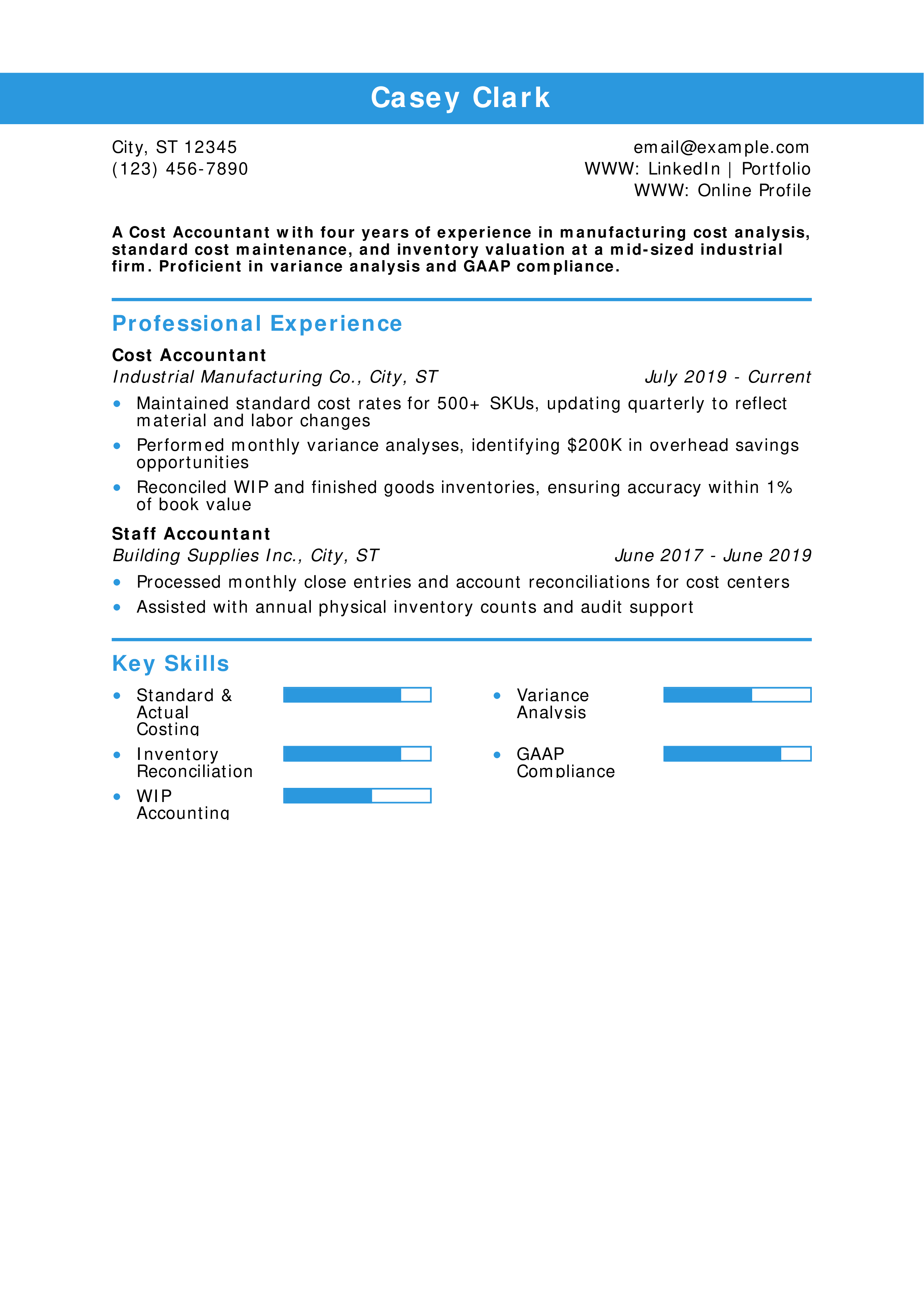
Why This Resume Is a Great Example
Casey Clark’s resume ties cost-accounting processes to tangible savings and inventory accuracy, which is core to the role. It shows both detail orientation and analytical impact.
Key Tips
Quantify savings in variance analysis to highlight cost control. For guidance on showcasing accounting achievements, see How to List Your Education on a Resume.
Consolidations Analyst Resume
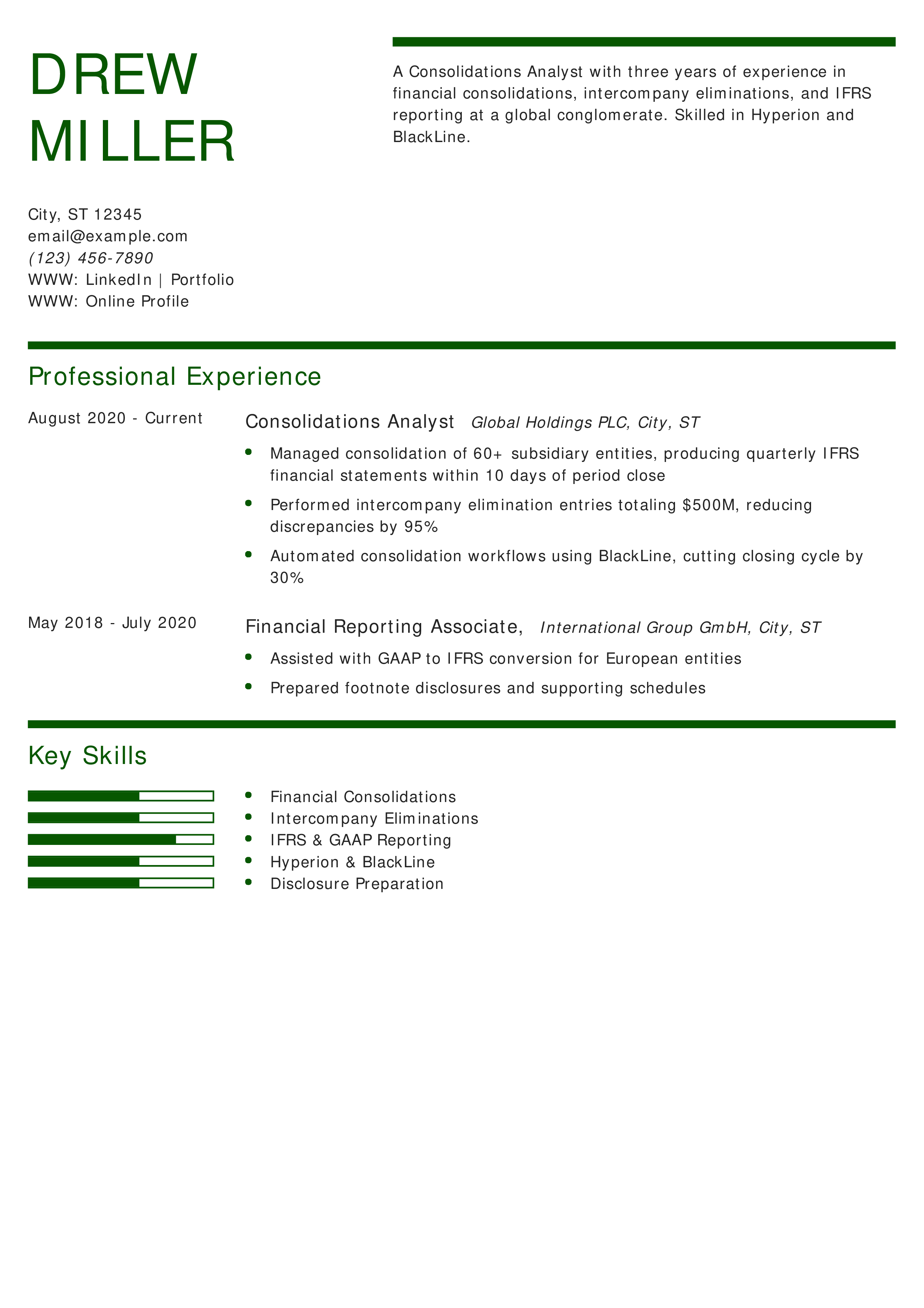
Why This Resume Is a Great Example
Drew’s resume highlights rapid IFRS close times and dramatic discrepancy reductions, which are key KPIs for a consolidations role. It shows strong systems and process expertise.
Key Tips
Emphasize cycle-time improvements (for example, “cut closing cycle by 30%”) to show efficiency. For tips on listing software skills, see Best Font for Resume.
Our templates are crafted by professional resume writers to make creating your resume quick, easy, and effective.
- Professional resume template downloads
- Customized cover letter generation
- AI resume writing support
- Career-building resources and advice
Financial Analyst Text-Only Resume Templates and Examples
How To Write a Financial Analyst Resume
1. Craft an outstanding profile with a summary of your financial analyst qualifications
A resume profile should provide a concise snapshot of your professional expertise and highlight your suitability for the position. In two to three sentences, introduce yourself and impress potential employers by sharing your years of experience and how your past successes make you the best candidate. Study the job description and pull keywords you can work into this paragraph to show your alignment with the role.
Then, speak to your abilities and emphasize your track record of delivering accurate financial insights, conducting comprehensive market research, or providing data-driven recommendations to support business growth. By aligning your profile with the position’s requirements and presenting your unique value proposition, you’ll impress and persuade recruiters to continue reading your resume.
Senior-Level Profile Example
Chartered Financial Analyst (CFA) with over 12 years of experience in financial management, supply chain management, and auditing. Highly capable of collaborating with senior-level staff and meeting multiple pressing deadlines. Deeply familiar with best accounting practices and financial management software systems. Proven relationship builder and motivator.
Entry-Level Profile Example
Enthusiastic entry-level financial analyst with two years of experience focused on using data to help businesses increase profits. Reduced waste and expenses for financial services companies and created dashboards for senior management and executive staff. Used MS Access and Excel to improve portfolios by at least 5.5% per year.
2. Add a compelling section featuring your financial analyst experience
Your professional experience section should show potential employers how you leverage your skills to accomplish daily tasks and long-term goals. Demonstrate your impact in previous roles and go beyond simply providing a laundry list of responsibilities. As a financial analyst, you’re all about numbers, so quantify your experience. Include specific metrics, such as percentage growth in portfolio value, cost savings achieved, revenue generated, or successful investment recommendations.
Providing concrete evidence of your work will help employers visualize the value you could bring to their organization and how you could add to their success. As you assemble these accomplishments in bullet points, use action verbs to make your writing succinct and impactful. Start each bullet point with a verb to make it easy for readers to scan through and capture information.
Senior-Level Professional Experience Example
Financial Analyst, United Companies, New Haven, CT
July 2008 – March 2015
- Developed forecasting tools to analyze revenue variance and industry trends, resulting in the discovery of a $2 million revenue opportunity
- Collaborated with accounting department in streamlining key processes, reducing labor overtime costs by 20%
- Executed core financial processes, including administration and reconciliations of bank accounts and operational expenses
- Reduced monthly forecast variance from 25% to 9% by communicating across departments to incorporate the most recent information in the forecasts
Entry-Level Professional Experience Example
Financial Analyst I, Enterprise Financial Headquarters, Miami, FL
January 2019 – present
- Provide bi-weekly and monthly summary reports for North Florida and South Georgia offices and custom dashboards for executive staff
- Found and eliminated recurring errors and duplications, saving the company 2.7% in annual expenses in North Florida and 1.3% in South Georgia offices
- Built data visualization reports showing ways to increase monthly client spending while expanding profit margins by at least 5%
3. Include financial analyst-related education and certifications
Demonstrating your educational background and showcasing your academic achievements in finance-related subjects is essential. This information reassures employers that you have a solid foundation in the field and can apply theoretical concepts to practical scenarios. Start with your highest level of education and list the degree name, institution, location, and completion date.
Additionally, include certifications such as CFA or Certified Financial Planner (CFP) on your resume. These credentials provide evidence of your expertise and dedication to professional development, setting you apart from other candidates. Create a separate section formatted similarly, listing the certificate title, issuing organization, and date received.
Certifications
Template
- [Certification Name], [Awarding Organization], [Completion Year]
Example
- ACCA Certificate in Data Analytics (CertDA), July 2017
- Microsoft Certified Data Analyst Associate, January 2019
Education
Template
- [Degree Name]
- [School Name], [City, State Abbreviation] [Dates Enrolled]
Example
- Bachelor of Science in Finance
- University of Florida, Gainesville, FL, August 2015 – December 2018
4. Outline your most useful financial analyst skills and proficiencies
Consider the skills hiring managers are looking for in a financial analyst. The best place to start is the job description for the position you’re interested in. Choose to include the skills that match what the company is looking for to prove you’re qualified for the job. Show that you stay current with the latest industry trends and technologies by incorporating relevant software proficiencies like Excel, Python, or Tableau. Here’s a list of examples you could include on your financial analyst resume:
| Key Skills and Proficiencies | |
|---|---|
| Budget management | Client relationships |
| Corporate financing | Data management |
| Economics | Financial modeling |
| Financial planning | Financial statements |
| Forecasting | Investment analysis |
| Market research | Profit and loss (P&L) management |
| Quantitative analysis | Regulatory compliance |
| Reporting and documentation | Risk assessment |
| Strategic planning | Task prioritization |
| Team collaboration | Trend analysis |
How To Pick the Best Financial Analyst Resume Template
A resume template serves as the foundation for presenting your qualifications and experience. The best template for financial analysts is clean, professional, and visually appealing. Look for a template offering a clear structure with well-defined sections for easy readability. Select one that aligns with the finance industry’s standards and expectations, emphasizing a modern and sophisticated look. It’s best to avoid overly decorative fonts and bright colors, as they can distract readers and give the wrong impression. Choosing a well-suited template will create a professional and polished resume that effectively showcases your expertise as a financial analyst.
Frequently Asked Questions: Financial Analyst Resume Examples and Advice
What is the best way to highlight my experience in my Financial Analyst CV?-
The best way to highlight your experience in your Financial Analyst CV is by emphasizing specific achievements in each role. Use bullet points to make your experience scannable and focus on results-driven accomplishments, such as improving processes or saving costs. Include quantifiable data like percentage increases or revenue growth to reinforce the impact of your work.
What are common action verbs for financial analyst resumes?-
When crafting the professional experience section of your resume, finding the right words to describe your work can be a struggle. It's common to run out of descriptive words that genuinely capture your accomplishments, but we'll help you overcome this hurdle. We've compiled a comprehensive list of action verbs that specifically speak to the work of financial analysts. These words will effectively communicate your accomplishments and enhance the impact of your professional experience. Consider using some of these action verbs on your financial analyst resume:
| Action Verbs | |
|---|---|
| Assess | Audit |
| Budget | Communicate |
| Ensure | Evaluate |
| Forecast | Generate |
| Identify | Interpret |
| Invest | Optimize |
| Organize | Present |
| Recommend | Reconcile |
| Research | Review |
| Strategize | Streamline |
How do you align your resume with a job description?-
The Bureau of Labor Statistics predicts employment for financial analysts will increase by 9% between 2021 and 2031. This growth will create more than 30,000 new jobs over the decade. Even though the field will see an influx of new opportunities, you'll still need to stand out from other applicants who are going after the same positions.
It's crucial to tailor your resume to a specific financial analyst job opening, especially when applying for a specific position. To do this, review the job description and identify key requirements and responsibilities. Then, align your resume with these points by highlighting relevant experiences, accomplishments, and skills directly related to the role.
What is the best financial analyst resume format?-
The most appropriate resume format for financial analysts is typically the chronological one. This style emphasizes a clear and organized timeline of your professional experience, making it easier for employers to assess your career progression and continuity. It lets you showcase your growth, achievements, and increasing responsibilities over time.
However, a combination format can also be effective, highlighting your relevant skills and accomplishments while still maintaining a clear employment history. It may be more suitable if you have transferable skills or are transitioning between industries. Ultimately, your choice should depend on your specific circumstances and professional goals.
How long should my financial analyst resume be?-
A financial analyst resume should typically be one page long, especially if you have less than 10 years of experience. A two-page resume may be appropriate for seasoned professionals with extensive achievements, but only if every detail adds value to your candidacy. Focus on conciseness and relevance by tailoring your resume to the job you're applying for. Highlight your most impactful accomplishments, certifications, and key skills rather than listing every career detail.
Including work experience from the last 10 to 15 years is generally recommended. Older positions can be summarized briefly or omitted unless highly relevant. Remember, your resume is a snapshot of your qualifications, not an exhaustive career history. Prioritize clarity and impact to make a strong impression.

A well-crafted cover letter can significantly enhance your chances of securing an interview during your job hunt. Customizing this document for the specific organization you're applying to is key. We invite you to explore our finance cover letter guide so you can write your own. For related cover letter examples, refer to our data analyst and accountant cover letter guides.
Craft your perfect resume in minutes
Get 2x more interviews with Resume Builder. Access Pro Plan features for a limited time!




